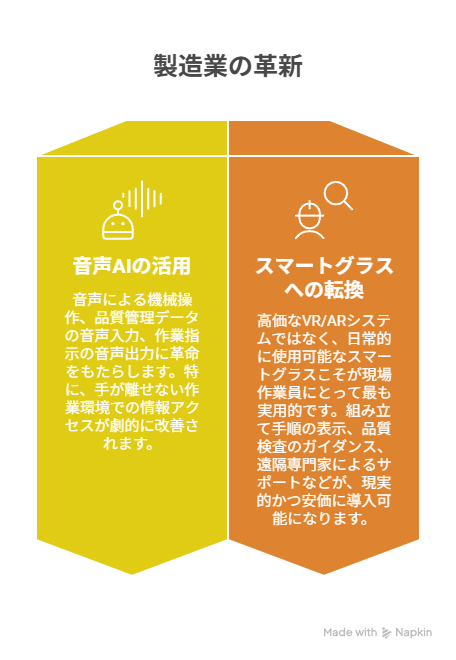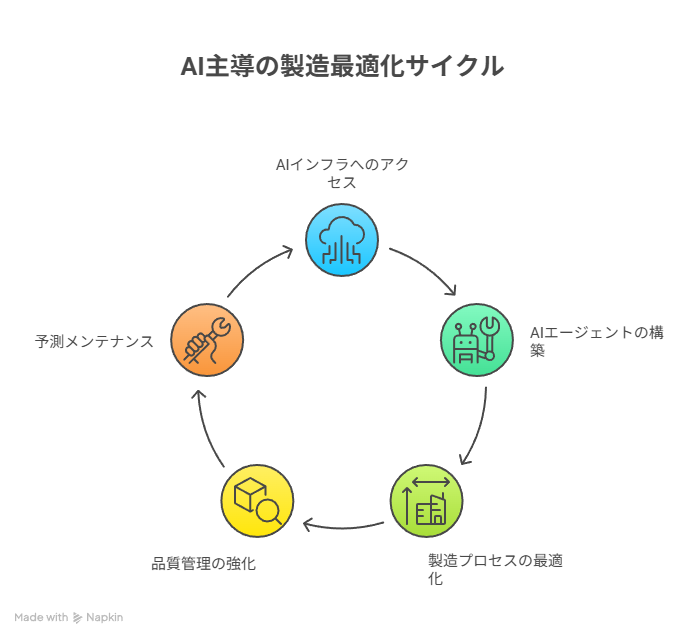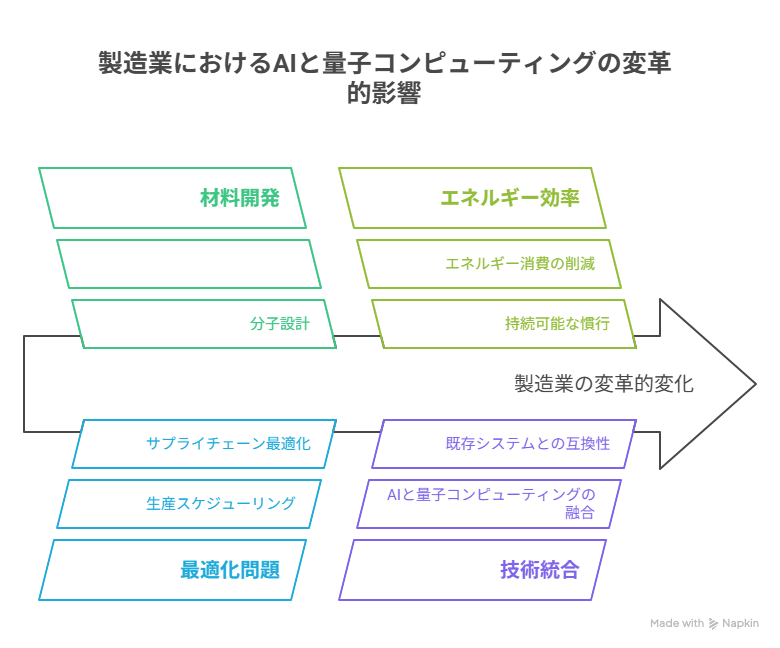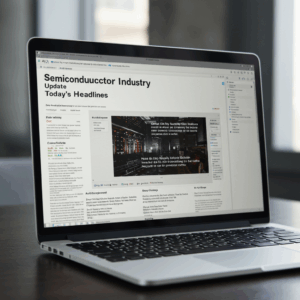This Week in AI Trends: Accelerating Practicality and Democratization Changing the Field
October 5-11, 2025. A series of AI-related news announcements over the past week are changing the definition of “AI applications” in the manufacturing industry. AI is no longer just the high point of a few large companies and research institutions.
The shift in strategy by major tech companies is shifting their focus from expensive systems to wearable and voice AI for everyday use by field workers, and the development of industrial AI infrastructure is accelerating the “democratization” of advanced computational resources, making them available to small and medium-sized businesses.
This article will provide an in-depth analysis of the major AI news events of the past week that are of particular importance to the manufacturing industry and how they can lead to specific productivity improvements for your company.
1. major tech companies’ AI strategy shift: from high-end to “on-site” smart
The “Practical Application” Phase of AI as Seen in the Simultaneous Deployment of Amazon, Apple, and Google
On October 1, at the dawn of the fourth quarter, three major tech companies – Amazon, Apple, and Google – announced a clear shift in the direction of their AI strategies. This synchronized move marks the transition of AI technology from the “research phase” to the ” full-scale market introduction ” phase.
- Amazon announces the Alexa+ ecosystem, which offers professional AI capabilities at a price point of $199. AI capabilities are now deeply integrated into traditional products.
- Apple has decided to pause development of its high-priced Vision Pro and focus its resources on developing more practical AI-powered smart glasses. This suggests new possibilities for the use of wearable AI in manufacturing settings.
- Google has transitioned its traditional Google Assistant to the completely AI-drivenGemini for Home. Priced from as low as $99, it is at a level that even small and medium-sized manufacturing companies can adopt.
Potential application in the manufacturing industry: Dramatic improvement of work efficiency through voice and visual AI
These trends will bring the following innovations to the manufacturing industry
Leveraging voice AI on the shop floor: Amazon’s improved Alexa+ technology will revolutionize voice-activated machine operation, voice input of quality control data, and voice output of work instructions on the factory floor. In particular, it dramatically improves access to information in a hands-off work environment.
From AR/VR to Smart Glasses: As Apple’s decision shows, everyday-use smart glasses, not expensive VR/AR systems, are most practical for field workers. Display of assembly procedures, guidance for quality inspections, remote expert support, etc. can be implemented practically and inexpensively.

2. maturation of industrial AI infrastructure: “ultra-fast AI” open to small and medium-sized enterprises (SMEs)
OpenAI’s strategy to strengthen its infrastructure and the emergence of “AgentKit
On October 6, OpenAI announced a strategic partnership with AMD and presented a concrete timeline for the realization of AI applications at the industrial level, with plans for up to 6 gigawatts of GPU deployment.
Announced on the same day, AgentKit is a suite of tools to help companies build and manage AI agents. The kit has the potential to greatly simplify the transition from the experimental phase to full-scale operation.
Specific impact on manufacturing: democratization of complex optimization
Democratization of Computational Infrastructure: OpenAI’s large-scale infrastructure investments will create an environment where even small and medium-sized manufacturers can access advanced AI computational resources via the cloud. This makes it feasible to deploy complex manufacturing optimization, predictive maintenance, and quality control AI that was previously only available to larger companies.
Manufacturing field application of agent-based AI: Tools such as AgentKit make it easy to build AI agents specialized for manufacturing-specific workflows that manage everything from parts procurement to manufacturing planning and quality control.

3. case study of AI innovation in the Japanese manufacturing industry: breakthroughs “not even experts could come up with”.
Sony Group Demonstrates Groundbreaking Results in AI Application
The Sony Semiconductor Manufacturing case reported on October 2 is particularly noteworthy as a practical success story of AI application; the company succeeded in improving the performance of a CMOS image sensor by approximately 70% through AI-enabled manufacturing process optimization.
This achievement was made possible by the “manufacturing conditions that semiconductor experts would not have thought of” proposed by AI, and concretely demonstrated that the potential for AI utilization in the manufacturing industry far exceeds the boundaries of existing knowledge and experience.
Manufacturing Industry Application of Emerging Technologies: Horizontal Development of Highly Accurate Image Recognition
The highly accurate cow weight estimation application jointly developed by Futsupar and Marubeni is a good example of AI image recognition technology developed in the manufacturing industry being applied to other industries. It is expected that this technology will be “reimported” to the manufacturing industry, enabling more precise product inspection and quality control.
4. integration of quantum computing and AI: future materials development and optimization
Establishment of quantum-AI composite infrastructure and acceleration of global investment
In October, SoftBank and RIKEN (RIKEN) began operating a hybrid platform connecting a quantum computer with an AI computation platform. This is an important step in Japan to accelerate research and development with a view to commercialization.
Globally, competition for investment in future technologies is intensifying, with more than $2.5 billion invested in AI chip and quantum computer development companies in the last quarter alone.
Long-term impact on manufacturing: optimization and the materials revolution
Revolution in materials development: The fusion of quantum computing and AI will enable molecular-level design of new materials, potentially reducing the development process from years to months. It will accelerate the development of lightweight, tough, and environmentally friendly materials.
Solving optimization problems: Complex optimization problems in manufacturing, such as production scheduling, supply chain optimization, and energy efficiency, have the potential to be solved with accuracy and speed previously impossible.

5. realistic challenges and solutions for industry DX: going over the “2025 cliff
The Importance of “White Box AI” in Eliminating Anxiety in the Field
As the “2025 cliff” problem warned by the Ministry of Economy, Trade and Industry becomes more serious, DX initiatives utilizing AI, IoT, and cloud computing cannot wait.
The ” white box AI ” proposed by a.s.ist, a startup from the University of Tokyo, solves an important issue at manufacturing sites. In response to the concerns of workers about conventional black-box AI, who wonder whether they can trust the answers given by AI, a .s.ist provides an environment in which even non-specialist workers can use AI with confidence by making the calculation process transparent.
Conclusion: The AI revolution will determine the survival of the manufacturing industry “right now, at this moment”.
The week of early October 2025 is a critical period in which the “practical application” and “democratization ” of AI technology accelerates and its full-scale introduction into the manufacturing industry becomes a reality.
The shift in strategy of major tech companies has made field operations smarter, while the maturation of industrial AI infrastructure has opened advanced AI technology to small and medium-sized companies. The Sony Group case study also proved that AI can deliver results that transcend existing expertise.
These trends provide the manufacturing industry with the following opportunities
- Democratization of technology: advanced AI will be within reach of even small and medium enterprises.
- Dramatic improvement in operational efficiency: performance improvements far outpacing the pace of previous improvements.
- Strengthen global competitiveness: Establish competitive advantage through rapid decision-making and optimization.
However, as the “2025 cliff” indicates, companies that fail to adapt to change risk falling into a serious competitive disadvantage. The key to success lies in accurately grasping technological trends and formulating and executing an AI utilization strategy suited to the characteristics of your business.
The next few years will be a critical tipping point in which the success or failure of AI applications in the manufacturing industry will determine the survival of your company. Is your company ready to ride this wave?
Source List
- Siemens Xcelerator Community – “Industry Signals October 7, 2025: How Industrial Leaders Are Rewiring for AI” https://community.xcelerator.siemens .com/home/blogs/industry-signals-october-7-2025-how-industrial-leaders-are-rewiring-for-ai-2025-10-06
- Wire Unwired – “AI Tech News October 2025: Amazon, Apple, And Google Unveil Bold Innovations” https://wireunwired.com/ai-tech-news-october-2025- amazon-apple-and-google-unveil-bold-innovations/
- Nikkei Crosstech – “White-box AI, a startup from the University of Tokyo, responds to manufacturing concerns.” https://xtech.nikkei.com/atcl/nxt/mag/nmc/18/00011/00322/
- NEXTOPT – “[25/10/2] Manufacturing x AI Application News” https://note.com/nextopt_jp/n/n8bdeaa35d554
- PR TIMES – “On the verge of the ‘2025 cliff’ – Where are we now in manufacturing DX and AI applications?” https://prtimes.jp/main/html/rd/p/000001807.000026157.html
- Financial Content – “Strategic Investing in the Quantum-AI Semiconductor Revolution” https://markets.financialcontent.com/wral/article/ tokenring-2025-10-8-beyond-the-hype-strategic-investing-in-the-quantum-ai-semiconductor-revolution
- Semiconductor Engineering – “Chip Industry Startup Funding: Q3 2025” https://semiengineering.com/startup-funding-q3-2025/
- Yahoo Finance – “Artificial Intelligence in Manufacturing Research Report 2025-2030” https://finance.yahoo.com/news/artificial-intelligence- manufacturing-research-report-080200453.html


